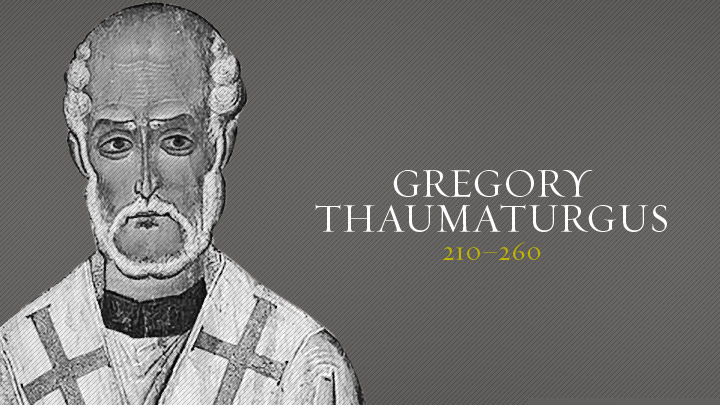"Gregory was a great and conspicuous lamp, illuminating the church of God." —Basil the Great
Parents today sometimes worry that their children will go off to college and return as converts to some strange, new religion. That's exactly what happened 1,700 years ago to Gregory of Pontus (named Theodore at his birth), only the strange, new religion was Christianity.
Born into an affluent pagan family in Neocaesarea (in modern Turkey), Gregory studied law and the traditional Greek and Roman classics. Then he and his brother were sent for further study to Caesarea in Palestine, where they enrolled in the school of the great Christian thinker Origen. Gregory came to learn pagan philosophy; his teacher converted him (and his brother, Athenodorus) to Christianity.
When Gregory returned home, he found a Christian community of 17 people waiting for him. Soon afterward, Gregory was elected bishop. Although his training was in speculative theology, Gregory's pastoral work was concerned with practical applications of the faith. His skills were such that some of his flock soon attributed miracles to him—hence his nickname "The Wonder Worker."
One legend tells how two brothers quarreled over possession of a lake and asked Gregory to arbitrate between them; Gregory is said to have divided the lake into two bodies of water, giving one to each brother. In another legend, he moved an entire mountain.
Timeline |
|
|
155 |
Polycarp martyred |
|
172 |
Montanist movement begins |
|
196 |
Tertullian begins writing |
|
210 |
Gregory Thaumaturgus born |
|
260 |
Gregory Thaumaturgus dies |
|
303 |
"Great Persecution" begins under Diocletian |
"Gregory was a great and conspicuous lamp, illuminating the church of God," wrote Basil. "He possessed, from the co-operation of the Spirit, a formidable power against the demons, that he turned the course of rivers by giving them orders in the name of Christ; and that his predictions of the future made him the equal of other prophets."
By both his friends and his enemies, Basil concludes, Gregory was regarded "as another Moses."
Legends or no, Gregory's leadership must have been great, because during his ministry, most of the city of Pontus converted to Christianity.
The help of Mary
Doctrinal conflicts required him to participate in several church councils that condemned false teaching. Though much more of a practical pastor than a theological writer, Gregory's writings are strong defenses of Trinitarian doctrine. According to Eastern tradition, his principal work, The Exposition of Faith, was given to him in a vision of John the Evangelist with the intercession of the Virgin Mary—the first recorded Marian apparition.
But despite his pastoral care of the community, many deserted during the persecution ordered by Emperor Decius in 250. Gregory himself fled into the surrounding mountains with many from his flock. In another of the legends, his enemies pursued Gregory and his deacon to one of their hiding places, but when they arrived, the Christians had been turned into trees.
When the persecution ceased, Gregory returned to Neocaesarea, only to have his flock further decimated by a plague. Then Goths sacked his beloved home city. By his death, his congregation is said to have dwindled down to 17—the same number as when he became bishop.










